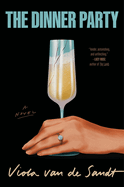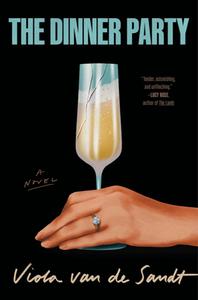
 The Dinner Party, Viola van de Sandt's propulsive debut, is structured around one fraught dinner party and the far-reaching ramifications it has on Franca's life after a somewhat unwilling stint as its hostess. Franca's account of the doomed evening begins as a collection of facts in an unsent letter she is writing to a long-lost friend at the behest of her therapist. Her report of the meal is carefully organized, starting with prep and mise en place and continuing through each course, right up to the sickly sweet spill of chocolate frosting at dessert. But amid that careful organization is lurking "that business with the knife," the alluded-to denouement of the evening that launches Franca out of the prim and proper life she's constructed and into something for which she has no menu, no plan, no recipe--something that, if she can only get there, might feel begin to feel like freedom.
The Dinner Party, Viola van de Sandt's propulsive debut, is structured around one fraught dinner party and the far-reaching ramifications it has on Franca's life after a somewhat unwilling stint as its hostess. Franca's account of the doomed evening begins as a collection of facts in an unsent letter she is writing to a long-lost friend at the behest of her therapist. Her report of the meal is carefully organized, starting with prep and mise en place and continuing through each course, right up to the sickly sweet spill of chocolate frosting at dessert. But amid that careful organization is lurking "that business with the knife," the alluded-to denouement of the evening that launches Franca out of the prim and proper life she's constructed and into something for which she has no menu, no plan, no recipe--something that, if she can only get there, might feel begin to feel like freedom.
Van de Sandt moves expertly through time in The Dinner Party, weaving together past and present to great effect. The intimate dinner party, thrown at the insistence of Franca's partner, is meant to celebrate a successful investment in his portfolio--and represent to his colleagues the role Franca plays as a supportive, dutiful housewife-to-be. With her therapist's urging and support, Franca--and the reader along with her--fills in some of the blanks of her memory around the event and the ways those lost memories and forgotten traumas hide within a person: her father's early death and her mother's year-long silence afterward. Franca buries these hurts so deep that even she believes she's unaffected by them, but when her only friend at university leaves the city, a sense of abandonment begins to spill over into every aspect of her being: what she studies and where, whom she loves and when, even how she prepares a dinner--and for whom: "The past is what it is, and the important thing is what we make of it. How we allow it to influence everything that comes after."
Within the frame of one alcohol-soaked evening, The Dinner Party expands to encompass the "everything after" of Franca's life as she begins to understand not only how her childhood traumas brought her to that evening, but where she might go next. "I didn't know," she writes plainly. "I didn't know anything about myself, who I was, what I wanted. I knew nothing about life." With sharp prose and emotional clarity, The Dinner Party is the tale of one woman coming to know about herself and about life, a breathtaking, fast-paced tale of a woman's hurt and rage and anger and despair and becoming. --Kerry McHugh, freelance writer
Shelf Talker: This debut novel spans the length of one doomed dinner party and the far-reaching implications it has on its unwilling hostess, in a propulsive tale of female rage and becoming.

